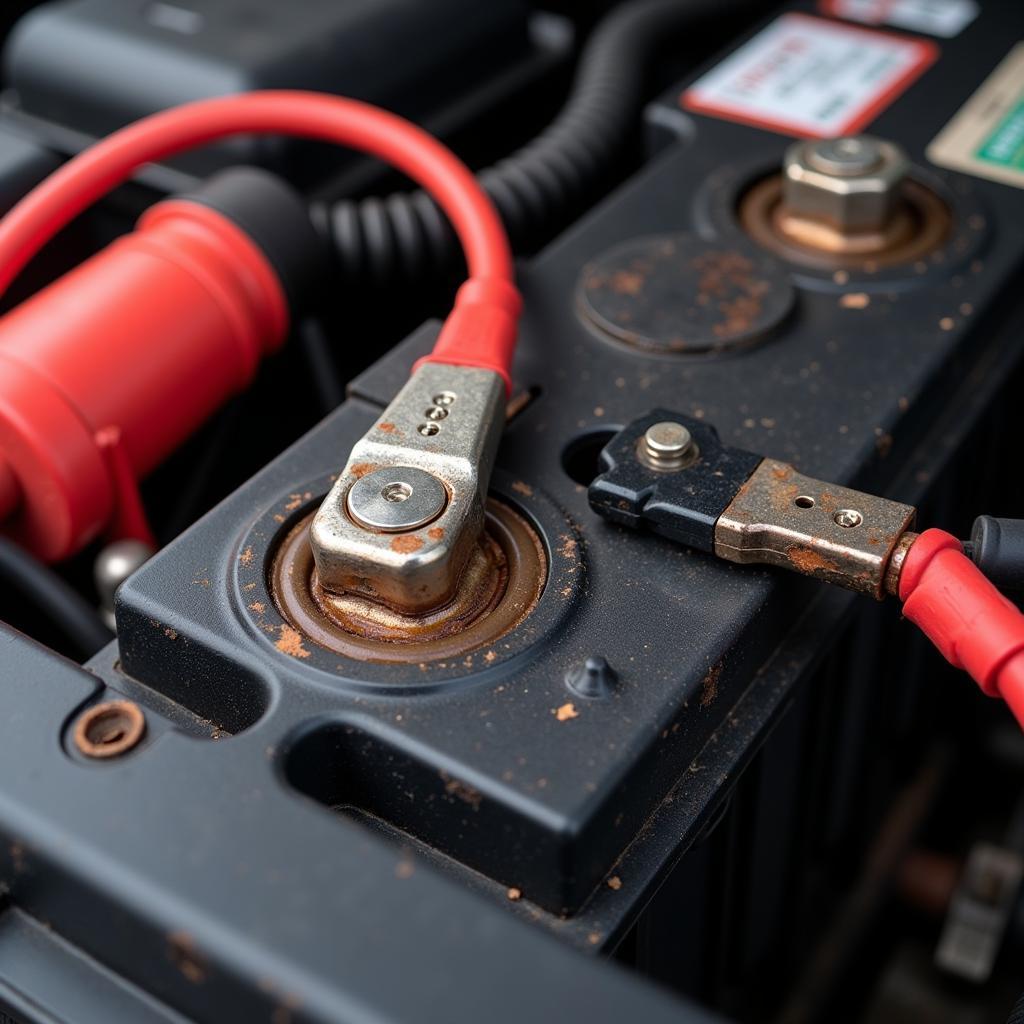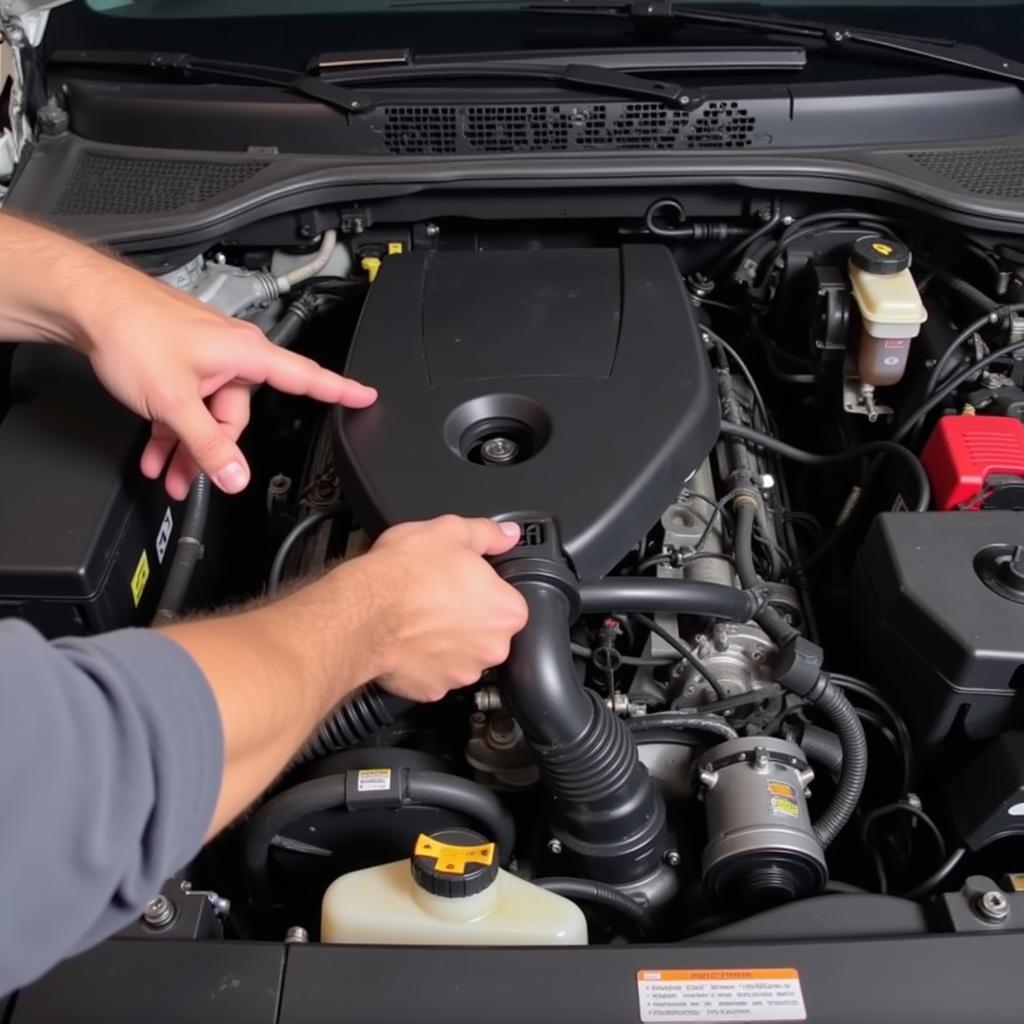Experiencing the frustration of a car that won’t start? You’re not alone. Car starting problems are a common headache for car owners, often striking at the most inconvenient times. Identifying the root cause can feel like solving a mystery, but understanding the common reasons behind these issues can help you get back on the road faster.
Why Won’t My Car Start?
There are numerous culprits behind car starting problems, ranging from simple fixes to more complex mechanical issues. Here’s a breakdown of the most common “Car Starting Problem Reasons” to help you diagnose the problem:
Dead Battery: The Usual Suspect
 Car Battery Symptoms
Car Battery Symptoms
A dead battery is the most frequent cause of car starting problems. If your engine is completely silent when you turn the key, or you only hear a faint clicking sound, a dead battery is likely the culprit. This can occur due to:
- Old Age: Like any battery, car batteries have a limited lifespan. Over time, their ability to hold a charge diminishes.
- Parasitic Drain: Leaving your headlights, interior lights, or accessories on for extended periods when the engine is off can drain the battery.
- Extreme Temperatures: Both extreme heat and cold can adversely affect battery performance and lifespan.
- Loose or Corroded Battery Terminals: Corrosion on the battery terminals can disrupt the flow of electricity.
Solution:
- Jump-start your car: This provides a temporary power boost to start the engine.
- Charge your battery: If the battery is simply drained, charging it with a battery charger might be sufficient.
- Replace the battery: If the battery is old or damaged, replacement is necessary.
Faulty Starter Motor: The Engine Won’t Crank
 Car Starter Motor
Car Starter Motor
When you turn the key and hear a clicking sound but the engine doesn’t crank, a faulty starter motor is often the issue. The starter motor is responsible for turning the engine over to begin the combustion process.
Symptoms of a Failing Starter Motor:
- Clicking sound when turning the key
- Grinding noise during starting
- Intermittent starting issues
- Starter motor runs but doesn’t crank the engine
Solution:
Starter motor issues typically require professional diagnosis and repair by a qualified mechanic.
Fuel System Issues: Starving the Engine
Without fuel, your engine won’t start. Several fuel-related problems can prevent your car from starting:
- Empty Fuel Tank: It seems obvious, but sometimes the simplest answer is the correct one. Ensure you have enough fuel in your tank!
- Clogged Fuel Filter: A dirty fuel filter restricts fuel flow to the engine.
- Malfunctioning Fuel Pump: The fuel pump draws fuel from the tank and delivers it to the engine. If it fails, fuel delivery is compromised.
Solution:
- Check your fuel gauge.
- Check your fuel filter and replace it if it’s dirty.
- If you suspect a fuel pump issue, consult a mechanic.
Ignition System Problems: No Spark
The ignition system generates the spark needed to ignite the fuel in the engine cylinders. Problems here can prevent your car from starting.
- Worn Spark Plugs: Over time, spark plugs wear down, weakening the spark.
- Faulty Ignition Coils: Ignition coils provide the high voltage needed for the spark plugs. A failing coil can lead to misfires or prevent the engine from starting.
- Bad Ignition Switch: The ignition switch, where you insert your key, can wear out, disrupting the electrical signals to the starter and ignition system.
Solution:
- Inspect and replace worn spark plugs.
- Have a mechanic test the ignition coils and replace any faulty ones.
- Replace a faulty ignition switch.
Sensor Malfunctions: Confusing the Engine
Modern cars rely heavily on sensors to control various systems, including the engine. A malfunctioning sensor can send incorrect signals to the engine control unit (ECU), preventing the engine from starting. Common culprits include the crankshaft position sensor and camshaft position sensor.
Solution:
Diagnosing sensor issues typically requires specialized diagnostic equipment. Consult a qualified mechanic for accurate diagnosis and repair.
Other Potential Car Starting Problems:
- Alternator Issues: While a failing alternator won’t prevent your car from starting initially, it won’t recharge the battery, eventually leading to a no-start situation.
- Timing Belt or Chain Problems: A broken timing belt or chain can cause catastrophic engine damage and prevent the engine from turning over.
- Electrical Problems: Issues with wiring, fuses, or relays can disrupt electrical signals necessary for starting.
Expert Insight:
“I’ve seen countless car starting problems in my years as a mechanic,” says John Smith, a seasoned automotive technician at Autotippro. “While a dead battery is often the easiest fix, it’s crucial to consider other possibilities, especially if you experience recurring issues. Don’t hesitate to seek professional help when needed.”
Conclusion
Diagnosing car starting problems can be challenging, but understanding the common reasons can help you narrow down the possibilities. By systematically checking the battery, starter, fuel system, ignition system, and considering potential sensor issues, you can often pinpoint the cause.
Remember, while some fixes are straightforward, others require specialized knowledge and equipment. If you’re unsure about any aspect of diagnosing or repairing your car, it’s always best to consult with a qualified mechanic.
Need help with your car starting problem? Contact the experts at AutoTipPro at +1 (641) 206-8880 or visit our office at 500 N St Mary’s St, San Antonio, TX 78205, United States.





Leave a Reply